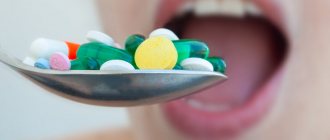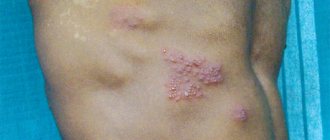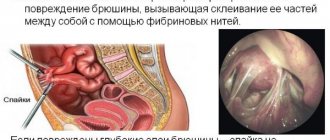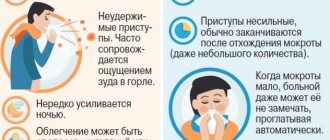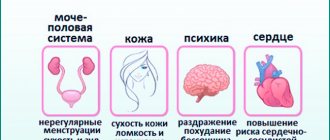A modern woman always strives to look impeccable.
But often with the onset of menopause, a woman begins to gain a lot of weight. It's not just hormonal levels that are to blame for this.
During menopause, women's taste preferences begin to change.
Many people develop a craving for sweets, which has a negative impact on their figure.
To regain their previous shape, some women begin to go on various diets to lose weight and exhaust themselves with physical activity, but during menopause, serious physiological changes occur in the female body.
Diets that are effective for losing weight at the age of twenty-five can seriously undermine your health after forty-five.
If the diet is chosen incorrectly, it will result in complications such as sagging skin and premature aging, as well as the development of serious complications from the heart and blood vessels.
Why do women gain weight during menopause?
Weight gain during menopause is associated with three reasons:
- Hormonal changes. At the age of 45 to 50 years, the level of estrogen, responsible for the general tone and metabolic processes in the female body, decreases. This entails hormonal changes. Metabolism involuntarily deteriorates. This means that only a third of the food you eat will now be converted into energy. The rest goes to fat reserves.
- An attempt to stabilize hormonal levels. Since a decrease in estrogen levels is an unexpected and stressful phenomenon for the body, against the background of a failure, it begins to look for an opportunity to obtain these hormones in other ways. And since fatty tissue can also produce estrogens, the body accumulates this in an attempt to balance the hormonal system. You end up with extra pounds and weight gain. That is why sometimes during this period some women can lose weight with the help of hormones selected by a specialist.
- Overeating due to stress. During menopause, women often experience hormonal mood swings. They either fall into depression, then withdraw into themselves, or become incredibly apathetic, depriving themselves of walks and other physical activity. In addition, ladies often eat up their worries with a large amount of sweets and other junk food. Hello there, overweight.
Source: aveslim.ru
General rules
Menopause (menopause) is a physiological period of a woman’s life, accompanied by involutional processes of the reproductive system, caused by the aging of the body and occurring in conditions of deficiency of sex hormones. For most women, their decline begins after 37-40 years and accelerates after 45 years. Within the climacteric period, along with menopause, there are several stages: the period of menopausal transition, perimenopause and postmenopause. At the same time, a significant proportion of women in the menopausal period develop climacteric syndrome , which is a pathological condition characterized by a complex of vegetative-vascular, neuropsychic and metabolic-trophic disorders.
Pathogenetically, these disorders are similar to the signs of estrogen deficiency syndrome and are manifested by atrophy of the mucous membrane of the reproductive tract, menstrual irregularities, weight gain, sudden attacks of redness of the skin and sweating, sudden changes in mood, depression, memory impairment, sleep disturbances, lack of energy, headaches , instability blood pressure , deterioration of skin and hair condition, dysuria , decreased libido and performance, and in a later period - osteoporosis and dysfunction of the cardiovascular system, which negatively affects the quality of life of women.
The main method of correction/prevention of menopausal disorders is hormone replacement therapy with various analogues of female sex hormones. Nutrition during menopause in women is also an essential component in the prevention of various disorders during menopause, which is due to a slowdown in metabolism and an increased risk of weight gain. Nutrition correction must begin already at the premenopausal stage, and during this period, strict food restriction/use of various unbalanced diets is unacceptable, and fasting is especially unacceptable.
As such, there is no diet for women during menopause, since nutrition during this period must be individualized depending on a number of factors: the presence of excess weight, metabolic rate, immunity , bone mass and muscle tone, the presence of disorders associated with menopause (joint and muscle pain, obesity , arterial hypertension , diabetes , osteoporosis and others). The main principle of women's nutrition during this period is to balance the daily diet with basic food nutrients with the correction of fat and carbohydrate components and saturate the diet with foods containing a wide range of vitamins and microelements.
If a woman experiences an increase in body weight during this period, a diet with reduced calories is necessary. To lose weight during menopause, food should not just be low-calorie, but allow the formation of a negative energy balance, that is, the calorie content of the diet should be less than or equal to the level of actual energy consumption per day when trying to lose weight or maintain a constant weight. The rule of thumb for losing weight is the need to reduce the calorie content of your diet by an average of 20% of your energy expenditure. For safe weight loss, body weight loss should not exceed 200-300 g/week, and the calorie content of the diet should not be lower than 1500 kcal/day.
Calorie reduction is achieved by reducing the consumption of animal fats and simple carbohydrates. The protein quota is not subject to restrictions. The consumption of saturated fats is limited/excluded - fatty red meat, meat by-products, sausages, solid fats (bacon, lard), canned food, smoked meats, fast food products, duck/goose meat, high-fat dairy products.
At the same time, the consumption of vegetable fats is not limited and, moreover, their presence in the diet is mandatory (cold-pressed vegetable oils, seeds, nuts). From animal fats, it is necessary to consume fish oil, which is found in large quantities in fish (herring, salmon, mackerel, tuna) and milk fats.
Restrictions also apply to simple carbohydrates - sweets, sugar, jams, cakes, preserves, pastries, pastries. Without restrictions, within normal limits, foods containing complex carbohydrates that contain a lot of fiber and vitamins (whole grain cereals, vegetables) are consumed, and it is recommended to reduce the consumption of white rice and pasta. Vegetables should be consumed both raw and cooked.
Preference should be given to carrots, pumpkin, onions, zucchini, beets, sweet peppers, lettuce, asparagus, cauliflower, garden greens, baked potatoes, and tomatoes. From fruits - citrus fruits, sour varieties of berries/fruits. No less important is the consumption of free liquid at a level of 1.5-2. l/day in the form of freshly prepared juices, herbal teas, green tea, still mineral waters, rosehip decoction. At the same time, the consumption of cocoa, black tea, coffee and alcohol-containing drinks should be limited to a minimum. If you are prone to hypertension, you should limit your salt intake, replacing it with herbs and seasonings that will give food a new taste.
Nutrition during menopause should also include phytoestrogens, the consumption of which in sufficient quantities can correct hot flashes. These are, first of all, isoflavones ( ginestein , daidzein ), which are found in sufficient quantities in legumes (soybeans, peas, beans); lignins , present in bran, oilseeds (flax seeds), whole grains, vegetables, legumes and fruits. Therefore, it is recommended to include flax seeds (40 g of seeds/day), soy products (beans, tofu, soy sauce), peas, and beans in the diet.
Antioxidants have a positive effect on a number of organs/systems , among which it is necessary to highlight resveratrol , contained in mulberries, skins/seeds of red grapes, peanuts, and sprouted beans. Resveratrol is one of the most powerful natural antioxidants; its effect is 5 times b-carotene vitamin C by 20 times, vitamin E by 50 times, and coenzyme Q10 by 17 times. Its effect has been proven in slowing down the aging process of cells and increasing their life expectancy, strengthens bone tissue, prevents the oxidation of low-density lipoproteins, and has an anti-inflammatory, neuroprotective effect.
To improve bone metabolism, it is extremely important to promptly replenish calcium and vitamin D and K . Clinical trials have found that adequate daily intake of calcium and vitamin D reduces bone loss and, accordingly, reduces the risk of osteoporosis and fractures. The recommended intake of vitamin D for premenopausal women is 400 IU and 800 IU for those over 50 years of age. Getting enough calcium in your diet is important to maintain bone mineral density.
The daily calcium intake for women during menopause is 1200–1500 mg. Equally important is to provide the woman’s body with vitamins B, C, A, E, PP, folic acid and microelements - iron, magnesium, potassium, selenium. If it is not possible to satisfy the daily need for vitamins and minerals through food, it is recommended to take an additional supplement as an independent drug - dietary supplements, complex vitamin-mineral products developed specifically for women during menopause: Menoril Plus , Inoclim , Qi-Clim for women 45+, Menoactive , Active Menopause , CX/X-Ex , Lady's formula Woman 40+, One A Day , Stop Klimaks and others.
https://youtu.be/nL7cjeFVvSg
Diet or how to lose weight during menopause
Many people associate menopause with troubles, they say that everything pleasant is behind us, and only old age lies ahead. In fact, everything is far from true.
We can say that nature sends the body on vacation, freeing it from childbirth. But this period is marked by another unpleasant moment - weight gain.
The vast majority of women recover at this time. But only poor nutrition is to blame for this, and not changes in the body. It is necessary to more carefully control the diet, since not only your figure, but also your appearance, as well as maintaining health, will depend on it.
During menopause, the production of female sex hormones stops. As you know, cholesterol is necessary for the synthesis of these, so the question of choosing foods containing fat becomes relevant.
Animal fats contain saturated fatty acids, which increase triglyceride and cholesterol levels. Products may not contain cholesterol, but they often contain saturated fats, so the former will be synthesized in the body.
When menopause occurs, preference should be given to plant foods, such as nuts and butter, because they contain polyunsaturated fatty acids that reduce cholesterol and triglyceride levels.
And fish and a number of vegetable oils contain monounsaturated fatty acids, which normalize the fat composition of the blood. Even by appearance, it is easy to distinguish the type of fat: saturated fats remain solid at room temperature, while unsaturated fats turn into liquid.
However, the latter should also be consumed in moderation. After the early onset of menopause, it is absolutely necessary to change your diet.
Although women who experienced it at an older age should also follow this advice to maintain their health and figure. It is recommended not to fry food, but to steam, boil, bake, the main thing is not to use fat and oil.
This will help protect against weight gain, as well as atherosclerosis and hypertension. It is worth limiting the consumption of fatty meats.
The fat streaks must be cut off from the pieces. It is better to give preference to poultry, but without the skin. Prepared meat products are allowed in small quantities - sausages, frankfurters, sausages, bacon, and offal.
Dairy and fermented milk products should have minimal fat content or be completely fat-free. It must be on the menu, as it is rich in proteins and vitamins. A diet for losing weight during menopause in women practically does not limit the consumption of fish and seafood.
You can’t give up cereals, pasta and flour products. They are sources of energy, but it is recommended to cook them in the oven, steamed or microwave, without fat.
It is useful to add bran to your diet. Cutlets, soups, porridges, and salads are prepared with them. This does not change the taste of the dishes, but they become much healthier.
By the way, they are included in weight loss according to the Dukan method - one of the most famous and effective diets.
Up to 100 g of nuts per day will saturate the body with proteins, trace elements and calcium. To reduce the risk of hypertension, you need to limit your salt intake. Instead, spicy herbs and various seasonings are used.
The main sources of vitamins are brightly colored vegetables (peppers, carrots, red cabbage), healthy greens, red-orange berries, fruits (currants, cherries). For those who cannot eat properly for any reason, multivitamin complexes are recommended. Typically they include 12 vitamins and minerals.
Source: beslim.life
Diet for weight loss during menopause in women: essence and main nuances
Proper nutrition during menopause plays an important role not only in weight loss, but also in promoting health.
Strict diets for women over 50 years of age are strictly prohibited, because they are distinguished by a meager diet in which there is an acute deficiency of vitamins, which can lead to premature aging, sagging and sagging skin, the development of cardiovascular diseases and other negative consequences.
A diet for women over 50 must be balanced. The menu should include fats of vegetable origin (nuts, oils), easily digestible protein products (lean meat, dairy and fermented milk products), carbohydrates (cereals, pasta), vitamins (vegetables, herbs, berries and fruits).
For example, a low-carb diet is very suitable for women over 50 due to its rich diet. You can view the menu here:
For women over 50 years of age, it is recommended to boil, stew, bake or steam dishes during a diet for weight loss.
Fried foods not only lead to the accumulation of fat deposits during menopause, but also to the development of hypertension, as well as atherosclerosis. Additionally, when dieting, it is recommended to take vitamin and mineral complexes and increase your level of physical activity.
Physical activity during menopause is important to strengthen and maintain muscle tone, as well as to normalize metabolism.
A diet during menopause in women excludes fasting and fasting days, which can lead to additional stress for the body, which can lead to the development of many diseases.
You should eat a varied diet and only healthy foods. Weight loss in women during menopause should be gradual, since it is important not only to maintain slimness, but also health.
Women over 50 years of age are advised to consume bran daily, which can be eaten either separately or added during cooking.
The Dukan menopause diet involves consuming 2 tablespoons of bran daily, which has a beneficial effect on the functioning of the gastrointestinal tract. When dieting, it is important for women over 50 not only to monitor the composition of their diet, but also to follow the basic rules of food intake.
Diet for menopause in women for weight loss - basic rules:
- Reducing daily caloric intake. Women during menopause need to reduce the calorie content of their diet by 15% to lose weight.
- You should eat often, at least 5-6 times a day. Small meals will help speed up your metabolism. The body will immediately waste the resulting energy without storing it in the form of fat deposits.
- The portion size when dieting after menopause should be halved.
- When dieting, it is recommended to have a hearty breakfast. Dinner should be light and less calorie.
- Diet snacks for women over 50 years of age are prohibited. The fact is that the body begins to digest incoming food during a snack, storing undigested food in fat reserves.
- 20-30 minutes before each meal you need to drink a glass of still water. Water will fill your stomach, which will reduce your appetite.
- The last meal should be 3-4 hours before bedtime.
- You should drink at least 1.5-2 liters of still water every day.
- It is recommended to exclude or minimize salt in the diet, as it increases the risk of developing hypertension during menopause. Instead of salt when dieting, it is better to use herbs and spices.
To return your body to its former shape, you don’t need to torture yourself with hunger strikes and work out in gyms all day long.
You just need to establish proper nutrition and provide your body with regular physical activity. You also need to adhere to some rules:
You need to eat in small portions, but often, about 5-6 times. This will allow the body to receive the necessary energy, which it will immediately spend and will not store it in reserve in the form of fat deposits.
You need to completely give up fresh baked goods and baked goods, confectionery, chocolate and other sweets.
Snacking is not allowed. When you do this, you force your body to store fat. Imagine, your stomach has not had time to completely digest the food that you consumed at breakfast or lunch, when other food is already entering it.
Naturally, it speeds up the process of digesting old food, storing it in the form of fat, and it begins to digest new food. So no snacking!
20-30 minutes before your meal, drink a glass of warm water or eat one unsweetened fruit. This will fill some of the stomach volume, and you will eat much less food at one time.
During the day, drink more than 1.5 liters of drinking water without any additives. This will speed up your metabolism. Breakfast should be hearty, but dinner, on the contrary, should be light. Don't eat 3-4 hours before bedtime.
Source: evehealth.ru diet-diet.ru
Nutrition during menopause and menopause: diet and healthy foods
It is important not only what to eat, but also how to do it correctly. The menopause diet after 40 consists of several basic rules.
The key is regularity. The intervals between meals should be approximately the same and occur at the same time every day.
Portions should be reduced by increasing the number of meals - up to 5-6 during the day. Chew your food more thoroughly, so you will feel full faster from less food. It is better to make breakfast the most high-calorie, so you have time to spend energy during the day. A snack before lunch can be made from nuts, dates, dried apricots. Don't forget about fresh fruits, which are also best consumed in the first half of the day.
You should not take a long break at night, and do not eat after 18.00. This is just as harmful as having a late-night snack after 9 p.m.
Among the processing methods that should be used to subject foods to food, you should leave cooking in the oven, steaming and stewing. Food should be at the optimal temperature. Too hot - damages the mucous membrane. But if it is too cold, or washed down with cold food, it is quickly evacuated from the stomach without having time to be sufficiently digested. Then it travels through the digestive tract for a long time, causing associated discomfort. And, besides, the feeling of hunger will come faster.
Plenty of fluids, especially water, will be helpful. 1.5-2 liters per day is recommended. Water will speed up your metabolism and fats will break down faster. It is better to limit drinking at night, otherwise it will lead to swelling in the morning.
For the same purpose, it is advisable to avoid salt or reduce it to a minimum. Avoid unhealthy foods.
A good rule of thumb is to drink about 100ml of warm water, fruit juice, or broth before eating. This method will give a greater feeling of fullness.
In psychology it is known that bright warm colors stimulate appetite and increase purchasing power. You can use this management trick to your advantage - place the portion on a small plate of cool colors, blue for example.
Permitted and prohibited products
The only way to guarantee weight loss during menopause for most women is proper nutrition. A diet for menopause involves a balanced, healthy diet.
Only a diet rich in vitamins and minerals saves from premature aging of the skin and the development of age-related diseases, helps maintain slimness and improves well-being, and also reduces menopausal symptoms and speeds up metabolism.
If you stick to this diet, you can easily lose weight at home. Healthy diet During menopause, be sure to include the following products in your menu:
- lean meat (beef, chicken, turkey, rabbit);
- low-fat dairy products (kefir, cottage cheese, fermented baked milk, yogurt);
- cereals and cereals of all types, bran;
- vegetables and herbs;
- fruits and berries;
- dried fruits, nuts, seeds;
- natural juices, herbal teas;
- fish and vegetable oils;
- onion and garlic;
- beans.
Preference should be given to dishes prepared in the oven, steamer, boiling or stewing. But frying should be avoided. Harmful foods Minimize or completely avoid consuming the following list of foods:
- fat meat;
- fast food and other semi-finished products;
- cakes, pastries, chocolate;
- sausage, frankfurters;
- smoked meats and canned food;
- spicy and unnatural sauces;
- margarine and vegetable spread;
- sweet soda and juices in boxes;
- coffee;
- alcohol.
Source: aveslim.ru
What minerals and vitamins should be present in products
While on a diet for weight loss during menopause, it is necessary to monitor the intake of vitamins and minerals into the body.
The most important of them are:
- Calcium. It is found in dairy products, soy, seaweed, yeast, almonds, and mustard seeds.
- Bor. There is a lot of it in prunes, asparagus, raisins, strawberries, and peaches.
- Lignins. Their source is flax seed and flaxseed oil.
- Magnesium. Sources of magnesium are cashew nuts, almonds, lettuce, wheat bran.
- Omega-3 fatty acids. They are contained in large quantities in fatty fish, walnuts, and flaxseed.
- Vitamin E. This vitamin is present in sufficient quantities in egg yolk, asparagus, avocado, potatoes, and beans.
Sample menu
Cereals, pasta, bread and potatoes are the main sources of energy for the body. Cereals such as oatmeal, pearl barley, barley contain a lot of iron, potassium, magnesium, B vitamins, and all these substances are necessary for normal heart function.
Berries, fruits, vegetables and mushrooms remove toxins and create a favorable environment for the formation of beneficial bacteria in the intestines.
In addition, they are rich in vitamins and minerals, fiber. You can increase your immunity with onions, herbs and garlic. In addition, the latter reduces blood pressure and normalizes sugar levels.
Therefore, the above products must be included in every woman’s menu. Dairy and fermented milk products are mandatory during menopause.
It is better to give preference to yogurt, kefir, and yoghurt. Such food is rich in calcium, which is so necessary at this time. It is recommended to consume hard cheeses and cottage cheese more often, but feta cheese and suluguni should be kept to a minimum because they contain a lot of salt.
Other sources of calcium include fatty fish, egg yolks, soy milk and fish oil. To avoid being bothered by so-called hot flashes, you need to drink a lot of water - up to about 2 liters per day.
It will replenish fluid loss from excessive sweating, and will also reduce the latter. Be sure to include protein foods in the menu: meat, fish, poultry, legumes and eggs. Preferably rabbit, turkey, chicken. Liver should only be eaten 2-3 times a month.
And eggs will bring more benefits not on their own, but in dishes (cheesecakes, omelettes, salads). It is advisable that fish be present on the table every day.
To have a varied diet, you cannot do without legumes, nuts and seeds. Butter should be kept to a minimum - no more than 1 tsp. per day, because it contains a lot of cholesterol. Olive oil is a dietary oil, so it is preferable. But mayonnaise should be completely excluded.
This also applies to other store-bought products. They only interfere with losing weight; all kinds of sauces, ketchup, and various juices should be eliminated.
As for sweets, they provoke the production of endorphin - the hormone of pleasure. It is better to give preference to marshmallows, marmalade and marshmallows, but in moderation. Bananas will be useful, but also in limited portions, as they contain a lot of sugar.
However, they contain potassium salts - useful substances that strengthen the heart muscle and nervous system. Has a similar effect:
- brown rice, cereals;
- dried apricots, raisins, figs;
- tangerines and oranges;
- potato;
- nuts;
- fatty fish;
- shellfish;
- yeast;
- bread made from unrefined flour;
- rose hip.
To strengthen the immune system, you will need vitamin C. It is found in large quantities in black currants, rose hips, bell peppers, citrus fruits, yoghurts, kiwi, potatoes and parsley.
In addition, vitamin C promotes wound healing and slows down the aging process. The diet for menopause includes potatoes, although losing weight on it, according to other methods, is very doubtful.
It contains a lot of starch, which interferes with weight loss, but it is necessary for the normal functioning of the body. Therefore, potatoes are eaten in moderation, boiled or baked. It perfectly regulates appetite. A similar effect is observed from grapes, brown rice, and wheat cereals.
All kinds of seafood are also welcome. They contain amino acids that protect the body from toxins.
There are a lot of such substances in crustaceans (shrimp, crabs, crayfish). Blueberries, grapes, as well as apples, apricots, melons and prunes have a similar effect.
The most useful protein meat product is chicken. It is often included in various diets. Preference is given to boiled or baked brisket without skin. Another important point to note is that the reasons for weight gain can be very different and not always related to menopause.
That is why women after 40 years of age should regularly visit doctors to monitor the body’s functioning and eliminate possible risks in advance.
The diet during menopause may differ significantly from that presented if a woman has any diseases that require certain dietary restrictions.
You can choose the following combinations of meals and products for the week.
For breakfast:
- muesli with milk (low-fat yogurt), banana and nuts;
- pumpkin pancakes, kiwi and strawberry smoothies;
- two toasts or bread with cottage cheese, an egg, fruit salad and green tea with mint;
- vegetable salad with olive oil, toast with berry jam, rose hips;
- oatmeal with blueberries, crispbread, plums or apricots;
- cheesecakes with low-fat sour cream, baked apple with honey;
- cornflakes, croutons with low-fat cheese, ginger tea.
For lunch:
- onion soup, stewed vegetables with fish cutlet;
- mashed potatoes with boiled chicken, fresh salad of vegetables and herbs;
- buckwheat with steamed fish, low-fat cottage cheese;
- cauliflower and green pea soup, legume puree;
- borscht made from lean meat, a piece of bread with fish pate;
- spaghetti with boiled chicken, grapefruit;
- chicken soup with fillet, two slices of whole grain bread.
For dinner:
- vegetable stew, rice cutlets, apple;
- boiled beans, a piece of bread with liver pate, an orange;
- buckwheat with steamed fish, a portion of low-fat cottage cheese with pieces of fruit;
- millet and lean chops, tomato and cucumber salad;
- vinaigrette with sunflower oil;
- baked potatoes, bell pepper and tomato salad;
- steamed chicken cutlets and fresh seasonal vegetable salad.
Source: aveslim.ru beslim.life
Proper nutrition during menopause: weekly menu for weight loss
The diet for menopause in women with hot flashes, as well as for weight loss, should be planned out day by day, creating a varied menu for the week. Thanks to this approach, it becomes possible to count calories for each meal. The amount of energy consumed per day should not exceed 1500-1800 kcal.
Monday
Breakfast. Not sweet yogurt with honey, crusty bread toast with a thin layer of butter and lightly salted salmon, a glass of freshly squeezed beet and carrot juice. Diet for a snack: dates and nuts, in addition - non-carbonated water. For lunch, eat soup with vegetables and veal meatballs, salad with tofu, vegetables, lettuce and olives. Berry compote. Midday meal - yogurt, dates, still water. Evening meal - steamed chicken, soybeans, cucumber, berry compote.
Tuesday
Buckwheat porridge with milk, toast with cod liver, sea buckthorn tea. Afternoon snack: granola* and freshly squeezed juice. Midday meal - fish soup, lazy cabbage rolls in tomato-sour cream (no more than 15%) sauce with basil, grated beets with olive oil and walnuts, fruit juice. Carrots, dates and nuts, a glass of still water - a great afternoon snack. Evening meal - vinaigrette, steamed fish, baked apple, herbal tea.
Wednesday
Cottage cheese with dried fruits pre-steamed with boiling water (about 10 minutes). Herbal tea with honey. Snack 2.5-3 hours before lunch - a large apple, nuts, still water. For lunch, enjoy lean borscht, steamed chicken meatballs, and cucumber. Herb tea. Make an afternoon snack of fermented baked milk and banana, not sparkling water. For dinner, prepare baked fish with Provençal herbs, red lentils and vegetable salad (tomato, bell pepper, cucumber), seasoned with olive oil, and dried fruit compote.
Thursday
Not a standard start to the day - granola*, herbal tea. Snack - fruit salad. Lunch menu: creamy carrot, potato and broccoli soup, unleavened spelled bread, turkey breast in berry sauce with mashed potatoes, berry compote. Afternoon snack banana with kefir. Dinner - steamed sea fish, boiled rice, tomato paste sauce with stewed carrots, vegetable salad. For dessert - herbal tea.
Read
Cause of hot flashes in women, other than menopause
Friday
In the morning, rice porridge with soy milk, a baked apple and tea with oregano will be good. Second breakfast is yogurt and apple. Glass of water. Lunch - vegetable soup, hemp flour cones with stewed fatty fish, fruit juice. Afternoon snack - toast with cheese, fermented baked milk. Evening meal - stewed vegetables, steamed chicken breast in berry sauce with barberry, herbal tea.
Saturday
Have breakfast with dried apricot casserole. Top with freshly squeezed juice. Additional breakfast - apple, nuts, raisins, still water. For lunch - beetroot soup with sour cream, hummus with seafood, a salad of fresh cucumbers, Chinese cabbage, flavored with lemon juice and olive oil, freshly squeezed carrot juice. Afternoon snack: biscuits with kefir. For dinner, make a steamed fish cutlet, stew carrots, zucchini and cauliflower, add fresh spinach leaves, and finish with herbal tea.
Sunday
For breakfast, a milkshake with flax** is perfect. The second, more satisfying breakfast is buckwheat kazha with cow's milk and a piece of butter (8 g), toast with cod liver. Herb tea. Snack - dates, 2 ripe kiwis, still water. For lunch - vegetable soup, veal stew with buckwheat porridge. Morse. Pear, nuts, glass of still water - afternoon meal. Dinner - steamed pike perch, stewed carrots with broccoli, vegetable salad with mustard oil, berry compote.
*Granola recipe:
Products for 1 serving:
- oatmeal, lightly baked in the oven - 100g;
- Nuts 60 g;
- Flax seeds 1.5 tbsp. l.;
- Raisins, dried apricots 60 g;
- 2 tbsp. spoons of honey;
- 40 ml apple juice;
- 1 tbsp. l pumpkin oil (or any vegetable oil).
Place the liquid ingredients in a thick-walled saucepan, heat slightly until the honey dissolves (do not heat above 60 degrees), turn off the heat.
Dry the pre-steamed dried apricots, cut into cubes and add to the container where the dressing was heated, stir thoroughly.
Bake on parchment paper in the oven for about 40 minutes, stirring occasionally. The golden color of the flakes will indicate readiness.
ADVICE! It is better to prepare this breakfast the day before so as not to waste time in the morning.
**Recipe for milkshake with flax.
Ingredients:
- 20 g flaxseeds
- Kefir 1 glass
- 150 g of any berries
- Quarter banana
Blend thoroughly.
The most informed decision is to contact a nutritionist who will create an individual menopause menu for every day to make losing weight as safe and comfortable as possible.
Contraindications
You need to be very careful during menopause. In some cases, diets will not work and will cause harm. Experts call the following contraindications:
- Chronic diseases of the digestive system.
- Diseases of the cardiovascular system.
- A serious condition caused by menopause.
- Problems with the endocrine system.
If a woman’s body is severely weakened, she does not feel the same energy, such nutrition is out of the question. You need a different diet, which the doctor will recommend.
If you have any chronic diseases, it is recommended to consult your doctor first. Individual nutrition adjustments are possible.
Source: foodexpert.pro
How to choose a diet and create the right menu
No medications will help you cope with weight gain if your diet is incorrect. It is important to observe the following principles:
- The body must receive all the necessary nutrients, minerals and vitamins. The use of mono-diets based on buckwheat or rice is excluded.
- Rapid and sharp weight loss during menopause is contraindicated.
- You should eat small portions up to 6 times a day. Eat your last meal no later than 19.00.
- It is better to make breakfast hearty, dinner, on the contrary, light.
- Fried, salty, fatty foods should be removed from the menu.
- It is important to drink plenty of fluids: tea, decoctions and, of course, water. You should avoid unnatural juices and carbonated drinks.
- Snacks excluded. As a last resort, you can use fruits or vegetables for them.
It is advisable to design the menu in such a way that every day 75% of the diet consists of fruits and vegetables, 25% - foods containing proteins, the rest - slow carbohydrates. It is advisable to include foods containing natural estrogens. These are cereals, pomegranates, nuts, beans.
Advice. You can replenish the hormone by drinking chamomile tea every day.
Let's try to create a menu for 5 days that will help you feel a little better. It will include only breakfast, lunch and dinner; between these meals you can snack on unsalted nuts, fruits, raisins, dried apricots, drink kefir or freshly squeezed juice.
| Day | Breakfast | Dinner | Dinner |
| 1 | Corn flakes with yogurt without additives | White fish, baked, salad with avocado | Boiled turkey fillet, apple |
| 2 | A piece of rye bread with low-fat cheese and cucumber | Vegetable soup, steamed veal cutlet with buckwheat | Cottage cheese with fruit |
| 3 | Cottage cheese with banana | Boiled chicken fillet with potatoes and dill | Bran bun, kefir |
| 4 | Vegetable salad | Baked champignons with brown rice | Avocado salad |
| 5 | Oatmeal in water with pomegranate seeds | Bean soup, lean beef pudding with cabbage and cucumber salad | Baked lean fish fillet, lettuce, cucumber |
How to save your results
You shouldn't expect quick weight loss. It takes at least two weeks to lose weight. If there are a lot of extra pounds, you will have to repeat the program several times, taking breaks of 1-2 months.
Proper, gradual weight loss can help you lose 5-8 kilograms per month. In addition to losing weight, as a result of a healthy diet, it will be possible to normalize the functioning of the digestive system and fill the body with vitamins.
The woman’s condition will improve and the pain will be relieved. You need to leave the diet if you have managed to lose weight, or if your doctor has advised you to complete this diet program.
It is better if the doctor monitors weight loss. It will be able to monitor a woman’s condition and help her lose weight without harm to her health. They leave this diet gradually, slightly increasing portions and including previously prohibited foods, but only in minimal quantities.
A diet for menopause is an effective method of combating extra pounds, helping the body during a difficult period. The diet will help normalize the functioning of the digestive organs and improve the human condition.
The products consumed during the diet will strengthen the body and allow you to achieve a beautiful figure even during menopause.
Source: foodexpert.pro
How to lose weight
Many people believe that it will not be possible to lose weight during menopause. It’s easy to think like that while sitting comfortably on the sofa, watching TV and sipping tea with sweets.
“Didn’t I deserve this after a hard, nervous, working day, preparing dinner, washing dishes and raising children?” – many will think. No, they didn't deserve it. You deserve health, a beautiful figure and the happiness of attracting attention and loving yourself.
Remember the slender, fit 50-55 year old ladies. Meeting each of them on the street is remembered for a long time. They cause pangs of envy, self-disappointment, and negative emotions.
But you have a chance to become the same. Don’t ask yourself whether it’s possible to lose weight during menopause, don’t look for reasons why this can’t be done, try to change!
There are many measures that can help you lose weight. It is impossible to list them all. They can be combined into 3 main groups:
- playing sports;
- menu correction;
- use of medications.
Let's try to talk about each of the points separately.
Diet recipes for menopause
Menopause is a period accompanied by a change in the activity of the gonads in a woman after 50 years. Menopause is accompanied by menopause, a change in the hormonal balance in the body.
The synthesis of progesterones and estrogens, which affect skin elasticity and fat absorption, gradually decreases and stops. Metabolic processes in the body in women during menopause slow down, which inevitably leads to excess weight gain.
A properly selected diet will help not only maintain a slim figure for women during menopause, but also improve their health and improve their well-being.
Source: diet-diet.ru
Chicken cream soup
Ingredients:
- Chicken breast;
- Onions 1 piece;
- Carrots 1 piece;
- Vegetable oil 1 piece;
- Bay leaf;
- Greens to taste.
Cooking method:
- Rinse the chicken breast, place it in a saucepan, add water, bring to a boil, reduce the gas and simmer for 20 minutes.
- Peel the onions and carrots, cut the onions into cubes, grate the carrots.
- In a frying pan heated with vegetable oil, fry the onion until golden brown, add carrots to it, simmer for 4-5 minutes, stirring occasionally.
- Remove the boiled chicken breast from the broth and grind in a blender.
- Add vegetable sauce and chopped chicken meat, bay leaf to the broth.
- Cook over low heat for 10 minutes.
- Pour the broth into a blender and blend until smooth.
- Before serving, garnish the dish with chopped herbs (dill, parsley).
Women experiencing menopause are advised to include cream of chicken soup for lunch in their diet menu.
Source: diet-diet.ru
Pumpkin porridge with raisins
Ingredients:
- Pumpkin 200 gr;
- Milk 250 ml;
- Rice 0.3 cups;
- A handful of raisins.
Cooking method:
- Peel the pumpkin, cut into cubes, add water, bring to a boil and cook for 10 minutes.
- Drain the water, put the pumpkin back into the pan, add washed rice and raisins, pour in milk.
- Bring to a boil, reduce gas and simmer over low heat for 15 minutes.
- Transfer the porridge to a baking container. Bake in an oven preheated to 180 degrees for 10 minutes.
Pumpkin porridge with raisins is perfect for breakfast when dieting after menopause for weight loss.
Source: diet-diet.ru
Cabbage salad
Ingredients:
- Cabbage 0.5 heads;
- Carrots 1 piece;
- Onions 1 piece;
- Greens to taste;
- Vegetable oil 2 tbsp;
- Lemon juice 1 tsp.
Cooking method:
- Peel carrots and onions. Grate the carrots on a coarse grater, cut the onion into thin half rings.
- Chop the cabbage thinly and press a little with your hands to soften.
- Transfer the vegetables to a plate, season with vegetable oil and lemon juice, and stir.
- Top the salad with chopped herbs to taste.
Cabbage salad will enrich the body of women during menopause with vitamins, and therefore it is recommended to include it in your diet while following a diet for weight loss.
Source: diet-diet.ru
Losing weight during menopause
Many women do not know how to lose weight during menopause, so they believe rumors that this can no longer be done. It doesn’t matter what age a woman’s body is – excess weight appears due to poor nutrition and low physical activity. Although metabolism does slow down during menopause, fat cannot appear just like that. In such cases, women are advised to keep a diary where they record what they eat during the day.
- Recipe for apple compote in a saucepan
- How to hem trousers using tape with video and photos. How to use iron and web tape for hemming trousers
- Dopamine - what is it, the hormone of happiness. How to Increase Dopamine Levels
After 40 years
Most women can gain excess weight before menopause. After 35-40 years, the body begins to prepare for menopause. Then some symptoms appear, indicating the imminent onset of menopause. “Hour X” can come at 50 or even 60 years old. It all depends on the individual characteristics of the body. Women's hormonal levels decrease - as a result, diets that previously helped to lose weight no longer work.
How not to gain weight during menopause
When considering the question of how not to gain weight during menopause, a woman should pay most attention to sports. Physical activity can easily keep your weight at the same level. It must be remembered that in order to avoid weight gain, any gymnastics must be supplemented by a proper diet. It’s easy to avoid gaining everything and maintain a slim figure if you follow simple rules:
- You need to exercise regularly during menopause, but not every day. 3-4 workouts per week are enough.
- There is no need to overload yourself. Only 20 minutes are enough to complete the exercises.
- If a woman feels that 20 minutes is not enough, she can gradually increase the time by a few minutes each week. The main rule is that exercise should be a joy and not cause discomfort.
- If 20 minutes is a lot, don't be disappointed. Between exercises, take short breaks of 3-5 minutes.
- It must be remembered that physical activity should improve tone, give the missing energy, and not take it away.
- It will be easier to maintain weight during menopause if you do gymnastics in the fresh air. However, drafts should be avoided.
- It is necessary to perform exercises in a comfortable sports suit made of natural material that allows the body to breathe.
- Be sure to combine physical and breathing exercises.
- Any exercise should be fun and easy. Otherwise it will be less effective.



